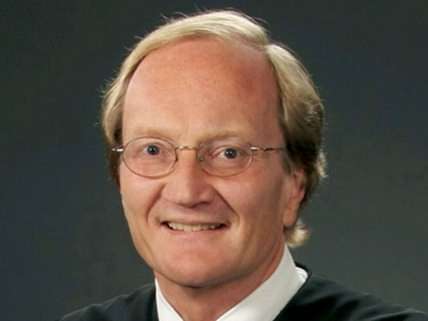Federal Judge Says Minnesota's Civil Confinement of Sex Offenders Is Unconstitutional
"We do not imprison citizens because we fear that they might commit a crime in the future," he says.

Yesterday a federal judge ruled that Minnesota's system for civil confinement of sex offenders who have completed their criminal sentences violates the 14th Amendment's Due Process Clause. Although the goal of the Minnesota Sex Offender Program (MSOP) is supposed to be treatment rather than punishment, its "patients" are never declared well enough to be released, creating the strong impression that "MSOP may very well be serving the constitutionally impermissible purposes of retribution and deterrence," as U.S. District Judge Donovan Frank put it in a preliminary ruling last year. In yesterday's decision, Frank concludes that is in fact what is going on:
The overwhelming evidence at trial established that Minnesota's civil commitment scheme is a punitive system that segregates and indefinitely detains a class of potentially dangerous individuals without the safeguards of the criminal justice system….
The stark reality is that there is something very wrong with this state's method of dealing with sex offenders in a program that has never fully discharged anyone committed to its detention facilities in Moose Lake and St. Peter since its inception in 1994. The number of committed individuals at these facilities keeps growing, with a current count of approximately 714 committed individuals and a projection of 1,215 committed individuals by 2022. In light of the structure of the MSOP and the history of its operation, no one has any realistic hope of ever getting out of this "civil" detention. Instead, it is undisputed that there are committed individuals who meet the criteria for reduction in custody or who no longer meet the criteria for commitment who continue to be confined at the MSOP….
The Fourteenth Amendment does not allow the state, DHS [the Minnesota Department of Human Services], or the MSOP to impose a life sentence, or confinement of indefinite duration, on individuals who have committed sexual offenses once they no longer pose a danger to society.
Frank explains why it is important to make sure that civil commitment is limited to "individuals who are suffering from acute symptoms of severe mental illness and who are truly dangerous to the public as a result of their psychiatric condition" and that "detention is absolutely limited to a period of time necessary to achieve these narrow governmental objectives":
If it turns out that the civil commitment is in reality punishment for past crimes or a way to prevent future crimes that might be committed, or, in the words of Justice Anthony M. Kennedy, "[i]f the civil system is used simply to impose punishment after the State makes an improvident plea bargain on the criminal side, then it is not performing its proper function."…
It is fundamental to our notions of a free society that we do not imprison citizens because we fear that they might commit a crime in the future. Although the public might be safer if the government, using the latest "scientific" methods of predicting human behavior, locked up potential murderers, rapists, robbers, and, of course, sex offenders, our system of justice, enshrined in rights guaranteed by our Constitution, prohibits the imposition of preventive detention except in very limited circumstances. This strikes at the very heart of what it means to be a free society where liberty is a primary value of our heritage.
Frank's decision does not immediately shut down the MSOP's "secure treatment facilities" and free the people confined there. Still to come is the "remedies" phase of the case, wherein Frank will try to figure out how the program can be modified so that it complies with the Constitution.
For those of us who view civil commitment of sex offenders as punishment or preventive detention in the guise of treatment, Frank's criticism of Minnesota's program and his defense of a despised minority's civil liberties are surely welcome. But while some states have better treatment track records than Minnesota, I am less confident than Frank that the distinction he urges can be enforced by the courts. The approach endorsed by the Supreme Court—treating sex offenders as responsible moral agents when they are serving their sentences and as helpless victims of mental illness when it is time to let them go—is fundamentally incoherent. The diseases the state is supposedly treating are defined by the same actions as the crimes it previously punished. From the start, this word game was an excuse for retroactively modifying sentences and for indefinitely confining people based on fears of their future crimes. All the talk of illnesses that cannot be objectively verified, let alone definitively cured, is little more than a quasi-medical, pseudoscientific justification for practices that would otherwise be seen as blatantly unconstitutional.


Show Comments (7)